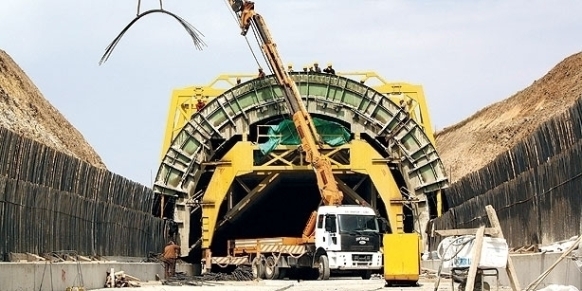
Turkey-Azerbaijan Relations: From Romance to Pragmatism
Publication: Eurasia Daily Monitor Volume: 12 Issue: 9
By:

By the end of 2014, Azerbaijan and Georgia had already completed the construction of their own sections of the Baku-Tbilisi-Kars Railway (BTK), which will connect the South Caucasus with Europe via Turkey (APA Agency, January 7, 2015). With its Azerbaijani portion finalized back in 2008, the BTK railroad required the construction of 105 kilometers of extra rail: 29 km within Georgia and 76 km of new rail line connections inside Turkey. The BTK is meant to become part of a rehabilitated Silk Road trade corridor across the Eurasian landmass, crossing the South Caucasus and Turkish Anatolia before reaching Europe.
From a global perspective, the BTK’s backers are ambitiously attempting to promote the railroad as an essential component within the multilateral TRACECA project (Transport Corridor Europe-Caucasus-Asia). Indeed, Azerbaijan assumed the primary role for lobbying for the BTK, which achieves an important political objective for Baku: maintaining its regional blockade on Armenia following the Karabakh conflict that erupted in 1988. Hence, the exclusion of Armenia from regional transit projects such as the BTK railroad has been an important goal of Azerbaijan’s foreign policy.
Sharing a border with Turkey has historically positioned Armenia along the original Silk Road trade routes. And several pre-existing roads connect the North Caucasus to eastern Anatolia via Georgia as well as from Azerbaijan to Turkey via Karabakh and Armenia—although the latter option is no longer viable due to the continuing conflict concerning the separatist Karabakh region. The BTK railroad, on the other hand, by design bypasses Armenian territory. Besides keeping Armenia out of the BTK railroad project, Azerbaijan opposes the resumption of operations along a currently defunct north-south railway connecting Russia with Armenia via Abkhazia and Georgia (Vestnik Kavkaza, November 24, 2014).
Although vigorously backed by Azerbaijan, the Baku-Tbilisi-Kars Railway project remains to be completed after seven years of construction. During 2012, the issue concerning the Georgian portion was overcome following a meeting between Azerbaijani President Ilham Aliyev and then–prime minister of Georgia Bidzina Ivanishvili. Georgia’s portion of the railway was finalized by the end of 2012 (News.ge, December 26, 2014). Whereas, the Turkish section of the project—which also happens to be the shortest—has taken the longest time to complete. The Mayor of Kars, a member of Turkey’s opposition Nationalist Movement Party (MHP), has attributed the delays to domestic corruption (Haqqin.az, November 24, 2014).
However, Azerbaijani expert Nazim Ceferov argues that corruption was not the real reason behind the Turkish delays. “Although it may not be imposed at a presidential level, Russia has surely been dedicating some effort in Turkey to delay the completion of this project,” he said in an interview with Jamestown. According to Ceferov, such Russian pressure serves two key objectives: “[To inhibit] the strengthening of strategic cooperation among Azerbaijan, Georgia and Turkey in the long run, and secondly, to prevent the further isolation of Armenia in the shorter term” (Author’s interview, January 14, 2015).
Yet, Andrey Sushentsov, the director of the Moscow-based Foreign Policy Analysis Group, disagrees with the notion that Moscow is behind the BTK’s delays. From Russia’s perspective, the concern is mainly about the way the BTK could help further strengthen the geopolitical axis formed by Azerbaijan, Turkey and Georgia in the South Caucasus. As Sushentsov asserts, “Russia would naturally oppose any […] cooperation projects in the region” that it was being excluded from or those that “were explicitly working against Russia’s interests.” But with the BTK railway project, he argues, “this does not seem to be the case.” Furthermore, Sushentsov posits, in the future, Turkey and Russia may also consider merging the Abkhazia-Georgia-Armenia Railway with the BTK Railway so as to overcome the isolation of Moscow’s ally Armenia (Author’s interview, January 14, 2015).
A separate reason for delays to building the Turkish section of the BTK railroad could be related to the Turkish government’s strained relationship with the Armenian diaspora. With 2015 marking the centennial for the claimed “Armenian Genocide,” the Armenian diaspora is increasing its pressure on Turkey this year. But in Turkey’s view, any steps taken at home or by foreign governments approaching a formal recognition of the tragic events of 2015 as a “genocide” could potentially reflect negatively on the parliamentary elections planned to take place in Turkey in June 2015. Keeping all these factors in mind, the Turkish government is currently seeking to implement relatively milder and more liberal policies concerning the Armenian Issue.
Turkey and Azerbaijan, however, seriously diverge on the Armenian Issue. Azerbaijan aims to gain an advantage in resolving the status of Karabakh by keeping up pressure on and maintaining a blockade against Armenia. Whereas, Turkey is more interested in tackling the Armenian Issue as an internal matter and is even considering opening up its border with Armenia. Ceferov suggests that Turkey has been delaying the completion of the BTK railway in order to deflect further pressure from the Armenian diaspora and the Armenian state—expected to increase this year due to the centennial—and accordingly, to alleviate the potential negative impact on its upcoming general elections (Author’s interview, January 14, 2015).
For Turkey, the BTK railway is an economic project that will ensure Turkish presence in the South Caucasus for years to come. But as Ceferov points out, in hoping to improve its relations with Armenians in both its domestic politics as well as foreign policy, Turkey has reservations about excluding Armenia entirely from the BTK project. Therefore, Ankara has been postponing construction of its section of the BTK in order to at least hold out the possibility that this strategic railway route could, at the last minute, be redrawn to cross Armenian territory, Ceferov argues (Author’s interview, January 14, 2015). Clearly, however, these differences in foreign policy approaches between the governments of Ankara and Baku indicate that the romantic period between these Turkic brotherly nations has apparently come to an end.
Both Turkish-Armenian and, subsequently, Turkish-Azerbaijani relations will likely be put to the test in 2015. But the governments of Turkey and Azerbaijan now look forward to the outcome of the inter-governmental Strategic Cooperation Meeting taking place today (January 15). Both sides hope the meeting will serve as a useful forum to review and discuss all these issues in order to avoid any new tensions or crises in bilateral relations (Yeni Musavat, January 12, 2015).




